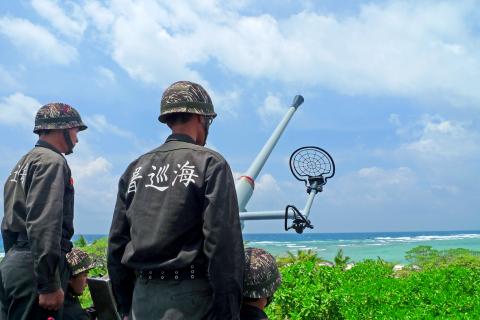Vietnam is unlikely to attack Taiwan’s military facility on the remote Itu Aba, also known as Taiping Island (太平島), in the South China Sea, President Ma Ying-jeou (馬英九) said yesterday.
Ma was speaking at an event at Greater Taichung’s China Medical University marking the sixth anniversary of his 2008 inauguration.
In light of territorial tensions in the region, Ma was asked whether Vietnam might attack Taiping Island, the largest of the Spratly Islands (Nansha Islands, 南沙群島).

Photo: Lo Tien-pin, Taipei Times
“Our assessments indicate it is very unlikely that [an attack] could happen,” Ma said. “First, the troops at the base on Taiping Island are selected from our Marine Corps and they are very capable soldiers. Second, Taiping Island is easy to defend and difficult to attack.”
“Most importantly, there will be political ramifications behind any military operation involving the Nansha Islands,” Ma said.
He added that the Ministry of National Defense General Staff Headquarters has strategic defense plans and reinforcements can be deployed quickly to Itu Aba.
Ma was asked why the national defense budget had not reached the target of 3 percent of GDP.
“The US government is always saying that Taiwan does not allocate enough money for national defense and therefore is unable to procure more weapons from the US,” Ma said.
The government does not lack money for arms procurements from the US, Ma said.
Before he became president in 2008, the previous government allocated money to buy US weapons, but was unable to make the purchase.
“The unspent money was returned to the government’s general budget and accounting department, which was a waste of government budget allocation. It was quite a pity,” the president said.
“If the US can inform us in advance that there are weapons available for purchase, we will certainly have enough money to buy them,” Ma said.
Itu Aba is 1,600km from Taiwan proper and is also claimed by China, Vietnam and Philippines.
Reinforcements can reach the island from Taiwan in four hours using C-130 transport aircraft, Deputy Minister of National Defense Andrew Hsia (夏立言) said earlier this week, adding that Cheng Kung-class frigates can reach the island in 36 hours in favorable weather.

ENDEAVOR MANTA: The ship is programmed to automatically return to its designated home port and would self-destruct if seized by another party The Endeavor Manta, Taiwan’s first military-specification uncrewed surface vehicle (USV) tailor-made to operate in the Taiwan Strait in a bid to bolster the nation’s asymmetric combat capabilities made its first appearance at Kaohsiung’s Singda Harbor yesterday. Taking inspiration from Ukraine’s navy, which is using USVs to force Russia’s Black Sea fleet to take shelter within its own ports, CSBC Taiwan (台灣國際造船) established a research and development unit on USVs last year, CSBC chairman Huang Cheng-hung (黃正弘) said. With the exception of the satellite guidance system and the outboard motors — which were purchased from foreign companies that were not affiliated with Chinese-funded

PERMIT REVOKED: The influencer at a news conference said the National Immigration Agency was infringing on human rights and persecuting Chinese spouses Chinese influencer “Yaya in Taiwan” (亞亞在台灣) yesterday evening voluntarily left Taiwan, despite saying yesterday morning that she had “no intention” of leaving after her residence permit was revoked over her comments on Taiwan being “unified” with China by military force. The Ministry of the Interior yesterday had said that it could forcibly deport the influencer at midnight, but was considering taking a more flexible approach and beginning procedures this morning. The influencer, whose given name is Liu Zhenya (劉振亞), departed on a 8:45pm flight from Taipei International Airport (Songshan airport) to Fuzhou, China. Liu held a news conference at the airport at 7pm,

Authorities yesterday elaborated on the rules governing Employment Gold Cards after a US cardholder was barred from entering Taiwan for six years after working without a permit during a 2023 visit. American YouTuber LeLe Farley was barred after already being approved for an Employment Gold Card, he said in a video published on his channel on Saturday. Farley, who has more than 420,000 subscribers on his YouTube channel, was approved for his Gold Card last month, but was told at a check-in counter at the Los Angeles International Airport that he could not enter Taiwan. That was because he previously participated in two

Taiwan was ranked the fourth-safest country in the world with a score of 82.9, trailing only Andorra, the United Arab Emirates and Qatar in Numbeo’s Safety Index by Country report. Taiwan’s score improved by 0.1 points compared with last year’s mid-year report, which had Taiwan fourth with a score of 82.8. However, both scores were lower than in last year’s first review, when Taiwan scored 83.3, and are a long way from when Taiwan was named the second-safest country in the world in 2021, scoring 84.8. Taiwan ranked higher than Singapore in ninth with a score of 77.4 and Japan in 10th with